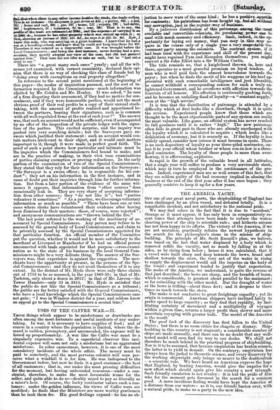USES OF THE CAFFRE THOSE things which appear to he
misfortunes or drawbacks are often among the most fortunate and useful incidents of any under- taking. In war, it is necessary to have supplies of food ; and of course in a country where the population is limited, where the de- mand is sudden, peremptory, and unconcealed, the expense will be forced up proportionately. A war like the Caffre war must be a singularly expensive war. To a superficial observer this inci- dental expense will seemuot only a misfortune but an aggravated misfortune. In sober earnestness, however, . it is one of the most consolatory incidents of the whole affair. The money must be paid to somebody, and the most perverse colonist will soon per- ceive what a windfall it is for him. He was indisposed to the Government before, but now he finds it a good customer—the best of all customers ; that is, one under the most pressing difficulties for the moment, but having unbounded resources—under a con- straint, therefore, to make the most favourable terms for the
seller, and quite able to do so—doubly urged to pay as liberally as a miser's heir. Of course, the lucky contractor values such a cus- tomer: under the golden influence, his views of Caffre wars are modified ; he finds that the Ministers are more worthy gentlemen than he took them for. His good feelings expand—he has no ob- jection to mere wars of the same kind ; he has a positive appetite for couteads ; his,patrietiemlas been bought up, butAll without any eorruption, just in the. regular. way of business.
By a judicious distribution of this patronage, among the niece available and convertible eolnists, its purchasing power eau be used with much-economy and effieiency. Such, indeed, is the op- portunity for laying out money, that yen may in this way ae- pure in the course only of a single year .a very respectable Go- vernment party among the colonists. The. contract system, if it had been tried with the experience and skill of the present day, might have regained Pym and Hampden themselves; you might convert a Sir John Elliot into a Sir William Curtis.
The title reminds us, that a knighthood thrown in, here and there, operates as a most graceful premium on loyal tenders. A man who is well paid feels the utmost benevolence towards the payer; but when he finds the merit of his waggons or his beef ap- preciated with such remarkable intelligence and just liberality, he cannot withhold a corresponding esteem for such a truly en- lightened Government, and he overflows with affection towards the fountain of all honour. His affection is continually gushing forth, and he becomes an unfailing flood of loyalty—a "constant supply," even at the " high service.' It is true that the distribution of patrenage is attended by a difficulty which at first looks like a drawback, though it is quite the reverse. Experienced people know that those which are thought to be the most objectionable parts of any system are really the most valuable. Like game, an official system has never ry ached its full goodness until it is rather " high. ' The new patronage often falls in great part to those who are already surcharged with the loyalty which it is calculated to acquire ; which looks like a defalcation of economy, but it is scarcely so. If the loyalty is less widely spread, consider how intense it must become in spots. There is no such depository of loyalty as your three-piled contractor, un- less it be your official whose brother or whose son-in-law is a three- piled contractor. The loyalty of these people is more than over- flowing, it is effervescing, explosive. • So rapid is the growth of the valuable breed in all latitudes, that a single year will suffice to produce a very serviceable stook, which may in turn be employed in the continuance of the pro- cess. Indeed, experienced men are so well aware of this fact, that they are seldom guilty of the bad 'economy impleeff,in closing the business at the end of the first.year after it has once begun ; they generally contrive to keep it up for a few years.


























 Previous page
Previous page